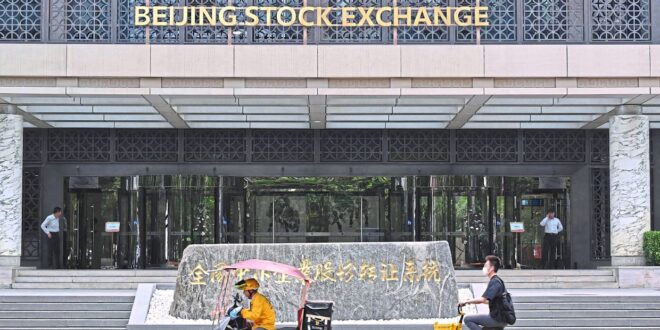BEIJING: China took some of its most extreme steps yet to restrict short selling and quantitative trading strategies, seeking to support the nation’s sliding stock market as a closely-watched economic policy meeting approaches.
The China Securities Regulatory Commission (CSRC) approved an increase in margin requirements for short selling starting July 22, making the trades more expensive for hedge funds and other investors.
Meanwhile, China Securities Finance Corp, the country’s biggest stocks lending provider, will suspend its business of lending securities to brokerages starting July 11.
The measures, announced late Wednesday after the benchmark CSI 300 Index dropped for the sixth time in seven sessions, send a clear signal that authorities want to stem a slump that erased about US$1 trillion of onshore market value since mid-May.
While that may provide a knee-jerk boost to sentiment, the already limited role of short sellers in China suggests any long-term impact may be limited.
Chinese authorities, along with counterparts in South Korea and Thailand, have been among the most aggressive in Asia in restricting short sales and quantitative trading strategies in an attempt to bolster share prices.
Yet the moves have done little to address the root causes of weak markets, which in China include persistent concerns about the country’s housing crisis, renewed trade tensions and low consumer confidence.
“This is coming at an opportune time for China’s stock market,” said Matt Maley, chief market strategist at Miller Tabak + Co.
“After the meaningful decline from the May highs, that market has become quite oversold. As these restrictions get implemented, there’s a good chance it will cause the kind of rally that will include a short squeeze. Thus, the upcoming reaction could be a powerful one.”
President Xi Jinping will convene the government’s Third Plenum, a once-in-five-years gathering, on July 15. Expectations for a massive stimulus are subdued, with analysts from Goldman Sachs Group to JPMorgan Chase & Co saying that Beijing will likely just scale up existing measures.
After rallying sharply from February, Chinese stocks have slid since May as unease grows over poor corporate profits. The CSI 300 Index has given up all of its gains this year, while the MSCI China Index is in a technical correction.
There are signs that the nation’s sovereign wealth fund is once again propping up markets through purchases of exchange-traded funds.
Under the new rules, investors need to put down a margin deposit equivalent to 100% of the value of the securities they seek to borrow for short selling, the regulator said in its Wednesday statement. Until the change, the ratio has been at least 80%.
The margin ratio for private funds participating in stock lending is also raised to 120% from at least 100%.
“In the short term, this will trigger the closing of existing short positions and limit the new opening of short-selling activities,” said Steven Leung, executive director at UOB Kay Hian Hong Kong. — Bloomberg
 BeritaKini.biz Berita Viral Terkini di Malaysia
BeritaKini.biz Berita Viral Terkini di Malaysia





